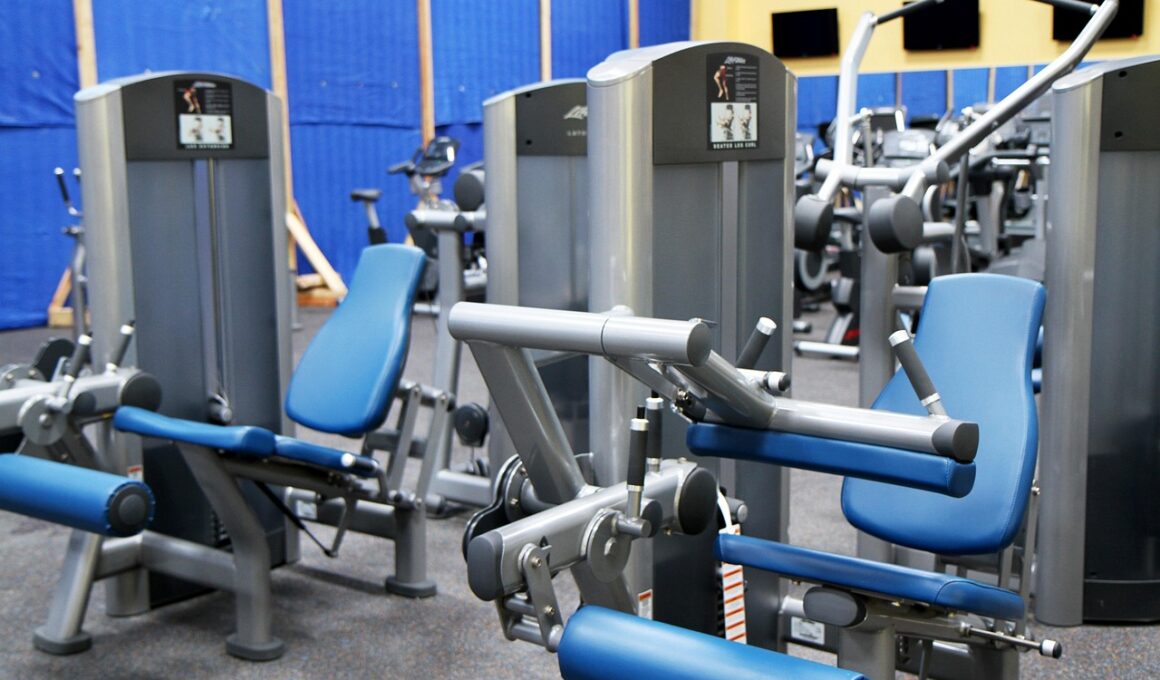Fueling Your Elliptical Cardio Workouts: Nutrition Tips
Embarking on an elliptical training journey means understanding how nutrition works in tandem with your workouts. Proper nutrition can enhance performance and improve overall training results. Start by focusing on digestible carbohydrates as they serve as the primary fuel source for energy during workouts. Foods like whole grains, fruits, and vegetables are excellent choices. They provide necessary vitamins and minerals that boost stamina and performance. Remember to hydrate adequately; drinking water before, during, and after exercise will prevent dehydration. Additionally, consider the timing of your meals. Having a balanced meal about two hours before your training session allows the body to metabolize food effectively and makes energy readily available. Keep snacks on hand, like protein bars or a banana, to refuel if you’re working out between meals. Lastly, assess your individual dietary needs based on your activity level and goals. Consult with a healthcare provider or nutritionist if necessary, as personalized guidance can optimize your training efforts further, ensuring your elliptical cardio workouts contribute effectively to your fitness journey.
Integrating quality protein into your diet is essential for repair and recovery post-elliptical workouts. Protein assists in muscle repair, which is crucial after engaging in intense aerobic sessions. Sources like lean meats, dairy, legumes, and plant-based proteins help replenish muscles and should ideally be consumed within an hour following your training. Equally important is to include healthy fats in your diet, found in foods like avocados, nuts, and seeds; they provide sustained energy. Fat takes longer to digest, ensuring that energy is available during longer workouts. Aim to incorporate a balance of carbohydrates, proteins, and fats into each meal to support optimal body function. Additionally, antioxidant-rich foods like berries can help reduce inflammation and speed up recovery. This incorporation supports muscle growth and recovery, allowing you to maintain a consistent workout regimen. Consider planning your meals in advance, ensuring balanced macronutrient composition. This method can prevent poor food choices following strenuous sessions. Lastly, keep in mind that your body’s needs might evolve, so periodic reflection on your diet can provide insights to better align nutrition with your fitness pursuits.
Hydration: The Key to Enhanced Performance
Hydration significantly affects how well you perform during elliptical workouts. Water regulates body temperature and keeps your joints lubricated, enhancing overall performance and reducing discomfort during workouts. Dehydration can lead to fatigue, diminished coordination, and even muscle cramps, severely impacting your ability to complete training sessions effectively. To stay hydrated, consider implementing a routine that includes drinking water before, during, and after your workouts. A general guideline is to drink at least half your body weight in ounces of water daily, adjusting based on exercise intensity and duration. If your workouts are particularly vigorous or extended, electrolyte drinks can help replace lost minerals but should be chosen carefully to avoid excess sugars. Monitor your body’s hydration signals: thirst and urine color are useful indicators. Light-colored urine generally indicates adequate hydration, while darker shades may suggest the need for increased fluid intake. Personalizing your hydration strategy based on your specific needs helps not only in enhancing performance but also in boosting recovery, allowing you to tackle future elliptical sessions with energy and vigor.
Pre-workout snacks can play an influential role in ensuring you maximize your elliptical workouts. Consuming the right snacks before exercise can help maintain energy levels throughout your cardio sessions. Target snacks that combine both carbohydrates and proteins, which can provide quick energy while also supporting muscle maintenance. For instance, consider options like a small bowl of oatmeal topped with fruits or a yogurt parfait with granola and berries. These alternatives offer the necessary carbohydrates that fuel your energy needs during training while the protein aids in muscle preservation. Timing is also crucial; ideally, consume these snacks about 30-60 minutes before your workout to give your body time to process the food and convert it into usable energy. Avoid heavy meals directly before your workout as they can cause discomfort. Furthermore, listen to your body’s signals; what works for one person might not suit another. Adjusting snack choices and timing can optimize your individualized training experience, enabling you to push harder during elliptical sessions and boost overall cardiovascular health.
Post-Workout Recovery Fueling
The importance of post-workout nutrition cannot be underestimated, particularly after intense elliptical training. Recovery nutrition is essential in restoring glycogen levels and muscle repair. Aim to consume a balanced meal or snack containing carbohydrates and proteins within an hour post-exercise. This meal will promote recovery and prepare your body for future workouts. Some excellent post-workout choices include a smoothie made with protein powder, bananas, and spinach or a whole-grain wrap filled with lean turkey and veggies. Both provide the nutrients needed for effective recovery while also being easily digestible. Remember to continue hydrating after workouts as well; replenishing lost fluids is vital to maintain performance in subsequent sessions. It’s beneficial to keep a journal of your post-workout meals, monitoring what works best for optimal recovery. Experiment with various snacks and timings to identify what truly resonates with your body’s needs. Adapting your post-elastic food choices ensures you are adequately fueling your workouts and priming your body for long-term health and athletic progress.
Incorporating variety into your diet can enrich your elliptical training experience significantly. A diverse meal plan not only helps in meeting your nutritional goals but also keeps your training enjoyable and sustainable. Rotate between different sources of proteins, such as chicken, fish, beans, and legumes; this variety ensures that you receive a broad spectrum of nutrients essential for recovery and performance. Additionally, exploring various fruits and vegetables each season can offer fresh flavors and beneficial antioxidants. Whole grains should also be included; consider oats, quinoa, or brown rice, all of which are hearty and effective sources of carbohydrates. Using herbs and spices can elevate flavors without adding unnecessary calories, enhancing meals with scent and taste. Planning weekly meal options can help in maintaining this variety, allowing you to shop with specific goals in mind. You might also want to try new recipes or cooking methods, encouraging consistency and reducing the risk of mundane eating habits. Listening to your body’s cues and preferences can ensure that nutritional choices reflect your individual health journey.
Consulting Professionals for Optimal Nutrition
If you’re unsure about the right nutrition plan to support your elliptical workouts, seeking the guidance of professionals can be incredibly beneficial. Consulting a nutritionist or dietitian can provide insights customized to your personal needs, goals, and fitness levels. These experts can help create a personalized meal plan that aligns with your training schedule, optimizing energy and recovery throughout your workouts. They can also offer valuable support and motivation, helping you remain committed to your nutrition goals. Additionally, monitoring your progress with a professional can help in making necessary adjustments over time, ensuring that your diet remains effective as your training evolves. Engaging with local fitness communities or online forums can also provide peer support as you share experiences and tips on nutrition strategies. Keep in mind that finding the right nutrition strategy often involves trial and error, but you don’t have to navigate it alone. Surrounding yourself with knowledgeable professionals and a supportive community can vastly improve your training outcomes and overall fitness journey.
Your journey with elliptical cardio workouts can be significantly enhanced through mindful nutrition choices. As you integrate these recommendations into your daily routine, remain open to the idea of continuous learning about food and its effects on performance. Being flexible with your nutritional strategies is crucial; adjustments based on your responses and evolving fitness goals will lead to greater success. Remember that fitness is not solely about training but also about how well you fuel your body. Each workout is an opportunity to refine your approach, whether it’s through meal planning, adjusting hydration strategies, or trying new foods. Celebrate small victories you encounter along the way as they contribute to your overall well-being and fitness journey. By prioritizing proper nutrition, you’ll enhance energy levels, improve recovery times, and maintain motivation throughout your elliptical training sessions. Ultimately, a well-rounded approach will empower you to enjoy the process. This holistic perspective encourages a balanced lifestyle, embracing the synergy between nutrition and exercise. Stay committed to your fitness aspirations; each choice builds on progress, leading to a healthier, fitter you.


